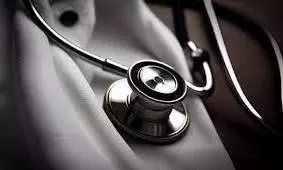
UK doctors develop AI-powered stethoscope to detect heart problems in seconds
text_fieldsThe traditional stethoscope, invented more than 200 years ago, has received a major technological upgrade.
A team of UK doctors has developed an AI-powered stethoscope that can diagnose heart conditions within 15 seconds.
The device can identify heart failure, heart valve disease, and abnormal heart rhythms. It works by analysing subtle changes in a patient’s heartbeat and blood flow that cannot be detected by the human ear. At the same time, it records a rapid Electrocardiogram (ECG).
Researchers from Imperial College London and Imperial College Healthcare NHS Trust created the tool with funding support from the British Heart Foundation and the National Institute for Health and Care Research (NIHR). The team presented further details of their work at the European Society of Cardiology annual congress in Madrid.
Dr. Patrik Bächtiger of Imperial College London’s National Heart and Lung Institute and Imperial College Healthcare NHS Trust noted that while the stethoscope’s design had remained the same for two centuries, new smart versions now allow a 15-second examination, after which AI can swiftly provide results indicating conditions such as heart failure, atrial fibrillation, or heart valve disease.
The device is considered a breakthrough in cardiology because it enables early detection of serious heart problems.
Experts say early diagnosis is crucial for effective treatment.
The AI stethoscope, however, is not intended for routine check-ups. Researchers recommend its use only on patients already showing symptoms of suspected heart issues.
The hardware was manufactured by Eko Health, a company based in California. Unlike a traditional stethoscope, its chestpiece is rectangular and connected to earbuds.
When placed on the chest, the device takes an ECG of the heart’s electrical signals while its microphone records blood flow sounds. The information is then uploaded to the cloud, where AI algorithms analyse the data for subtle heart problems that may be overlooked by doctors. The results are sent back and can be viewed on a smartphone.
























